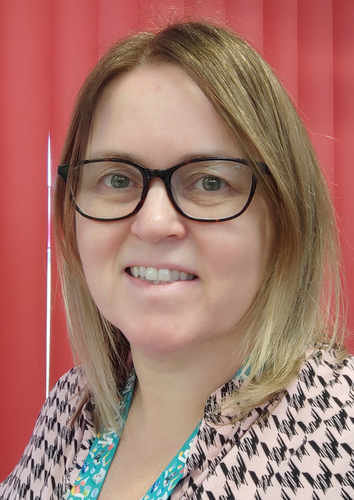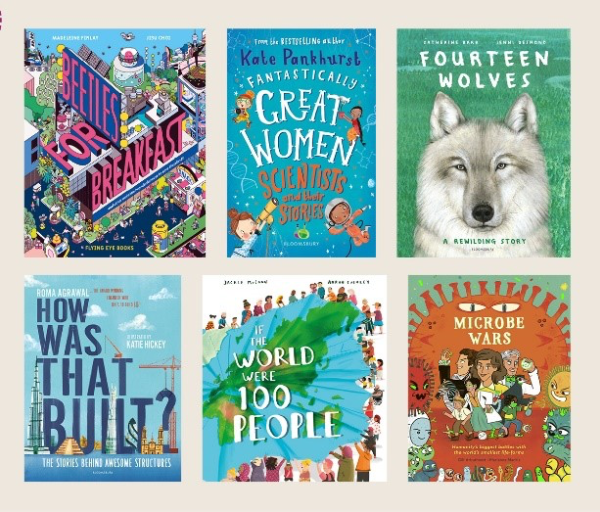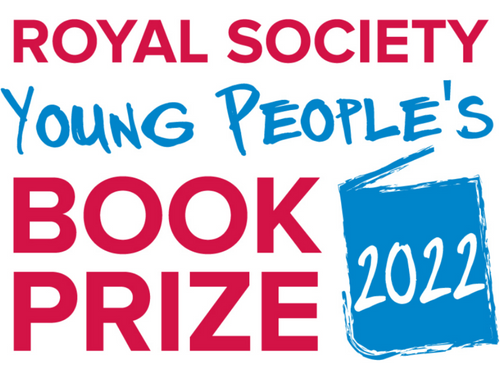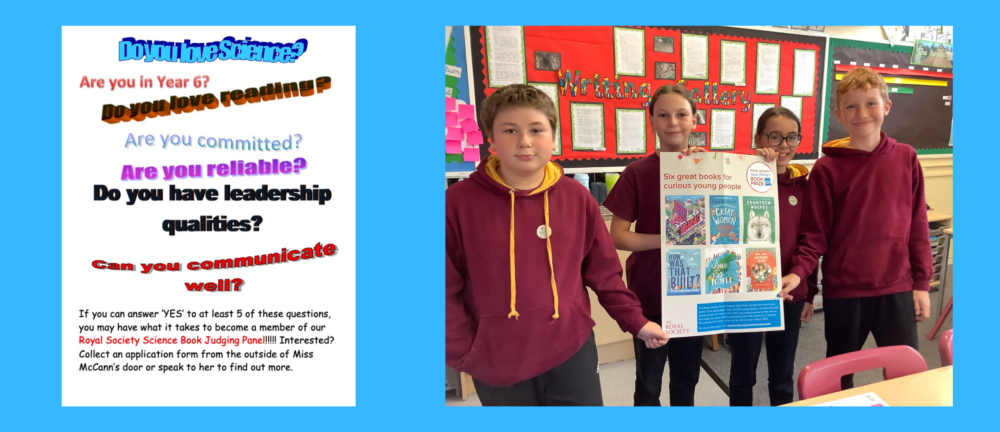Judging the Young People’s Book Prize : a teacher’s perspective
8 February, 2023 Dawn McCann is a Year 4 teacher and Science Lead at Hillside Primary School, a single-form entry primary school in Stoke-on-Trent. She has been running a judging panel for the Royal Society Young People’s Book Prize for over five years. She talked to Literacy Hive about why she got involved with the prize, how she runs it in her setting and the benefits it brings to the pupils involved.
Dawn McCann is a Year 4 teacher and Science Lead at Hillside Primary School, a single-form entry primary school in Stoke-on-Trent. She has been running a judging panel for the Royal Society Young People’s Book Prize for over five years. She talked to Literacy Hive about why she got involved with the prize, how she runs it in her setting and the benefits it brings to the pupils involved.
What made you decide to get involved in the Young People’s Book Prize?
I’ve been the Science Lead at Hillside Primary for eight years and am always looking for ways to promote science in the school. When I first saw the Young People’s Book Prize advertised, five or six years ago, I thought it would be a great enrichment activity and an opportunity to build cross-curricular links with English. We have always had a strong programme of science enrichment activities – we celebrate Science Week every year, run whole-school science competitions and have speakers in to talk to the students – but a lot of the activities tend to be practical. What I liked about the Young People’s Book Prize was that it offered a slightly different kind of enrichment and an opportunity to promote reading, especially for those children who are good scientists but maybe not eager readers. At the time, we had a few boys who were amazing at the practical aspects of science but who struggled a bit when it came to reading and writing. I thought getting involved with the award would be perfect for them.
How do you recruit your young judges?
Numbers have varied over the years but I have never had a problem recruiting judges, even amongst more reluctant readers. I think it’s easier for me, in some ways, because the children know that I am the Science Lead and that I tend to do a lot of practical, hands-on activities. If they see me promoting a club, they are more likely to think it will be their kind of thing and I can lure them in! And then, once they’re involved, they find they really enjoy it. I remember there was one young judge last year who was quite a reluctant reader but who liked one of the shortlisted books so much he put it on his Christmas list so that he could have it to read again and again. His Mum commented on how much he was enjoying the book and how they were sharing it at home together. It was one of those lovely light bulb moments where having access to the right book and the right genre had a massive impact.
I make sure I really promote the award to pupils. As soon as the official poster featuring the shortlisted titles arrives, I put it up alongside my own recruitment poster with questions like ‘Do you love science?’, ‘Can you communicate well?’, ‘Do you have what it takes to be a member of our judging panel?’. I always stress that this is an official role with the Royal Society, not just something that we are doing in school. And I am also very clear about the expectations: that the pupils need to commit to getting to know the books and attending all the judging sessions in order to take part. I think that helps to make them feel that being a judge is an important role.
How do you run the award in your school?
I run the award as a voluntary, after-school club over a term (ten weeks). Each session runs for about 40 minutes at a designated time every week. I run it with Year 6 pupils as I feel that I get more from them. They have better skills for the book discussion and are more able to cope with the range of reading levels. If there is a book for 7-9 year-olds, they can look back and remember what it was like to be a younger reader. And with the older books, they will pick up on challenging vocabulary but they can recognise that the book is aimed at an older audience. I think it’s good for them to visualise themselves as readers of different ages.
I normally have about eight pupils in the group and aim for a maximum of ten. I feel this is a manageable size and gives everyone the chance to speak. I know there are some schools who run the award with a whole class but I think it works really well with a smaller group. It’s more intimate; we can all sit round one table with the books spread out in front of us. Plus, because it’s something they have all chosen to do, I feel we get some really high quality discussions.
Tell us about the judging process
As well as posters and review sheets, the Young People’s Book Prize provides all its young judging panels with a free set of the shortlisted titles. There are six books on the shortlist so, if there are more than six judges on our panel, what I tend to do is include some books from previous years so that each child has a book to review each week. We don’t read the books during our club time, we use these sessions to discuss the books so there is an expectation that the judges will have read and reviewed their book during the week. The books can vary quite a bit in length – in 2020, one of the shortlisted titles, In the Key of Code, was quite a thick novel, other titles you can dip in and out of. I always explain at the start of the judging process that the children don’t have to read the entire book, but they do need to familiarise themselves with it and to have read enough of it to be able to fill in the review sheet and talk confidently about it in the session.
When we meet, each judge presents the book that they have read that week. To start with, I chair the meeting and coach the children on how to present the book and participate in the discussion. But, very quickly, they start to lead the session themselves, taking it in turns to be chair. I will provide support if somebody is struggling, or throw in the odd question to prompt discussion but, generally, the children run things really well.
The first couple of sessions, the discussion can be a bit dry because each child is presenting a book that hasn’t yet been read by any of the other children but, as the weeks go by, the discussions get more involved and the children start to compare the books: I like how the illustrations work; I thought it was quite hard for younger children...; Can you turn to the page where…; I think this one is even better because… There is some really grown-up discussion and you can see that they know the books in depth. We always have a break with some juice and a biscuit but, even then, there’s usually some mini discussion going on or somebody flicking through a book to check something. In the last week, I ask the children to tot up the results, organise all the review sheets for each book, and then they are responsible for entering our final verdict on the Royal Society website.
 What do you think the young judges get out of being involved?
What do you think the young judges get out of being involved?
I think being involved in a ‘real’ event – knowing that what they are doing has an impact outside of school – is a big thing for the children. They know that their vote affects an author’s chances of winning a prize, that their opinion matters, and this makes them feel valued and listened to. And then there is the excitement of watching the live award presentation and seeing whether their choice of winner matches the overall winner!
The children also gain a lot of confidence from the judging process and the whole ethos of the after-school club. The fact that they take it turns to lead the sessions, the speaking and listening skills they develop, and the understanding of how a meeting runs are all hugely valuable.
The cross-curricular links between science and reading are also very powerful, especially for those children who don’t see themselves as readers. Children can sometimes see science as something separate. Having the opportunity to read and review all those books with a science theme not only feeds their interest in science but also helps them to develop as science readers.
And what do you get out of it as a teacher?
I love anything to do with science but I particularly like the way the award brings science and reading together. There’s already a lot of interest in science amongst the pupils in school and being able to link that through with English is very rewarding. Plus you get to keep the books!
I am always so impressed by the depth of discussion in the meetings and the children’s ownership of the whole process. It’s fascinating to listen to them and I love to see how they interact and they way they argue things out – they are a real judging panel.
I’ve been involved with a Stoke-wide project called Science Across the City which has helped to develop a community of science leaders in schools that share ideas and information. When Hillside first signed up for the Young People’s Book Prize, very few teachers in the area had heard about it. This year there were about 20 local primary schools who get involved. Up until now, each school has run the award independently but there is some interest in looking at ways that we could collaborate in future years, perhaps by running some inter-school discussion groups.
Taking part in the Royal Society Young People’s Book Prize is a win-win situation for everyone involved and definitely something I would recommend. I already have the registration date for next year’s award in my diary. We love it!
The winner of this year’s Royal Society Young People’s Book Prize will be announced in early March. Find out more about the Prize and how your school can get involved here.


